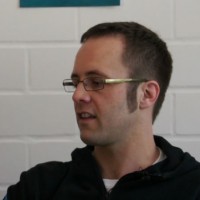Andreas Kubicek
Postdoctoral Research Fellow
University of Queensland

From 2005 to 2022, the main node of the ARC Centre of Excellence for Coral Reef Studies was headquartered at James Cook University in Townsville, Queensland (Australia)








Postdoctoral Research Fellow
University of Queensland
Andreas originally come from Germany where he completed a Master in Biology for which he did field work and experiments on algae in the intertidal of Japan, before he changed his focus to ecological modelling during his PhD. Andreas came out to Australia to join Ove Hoegh-Guldberg’s group in the ARC Laureate project to study effects of Climate Change on metabolism of coral reef communities.
Andreas research focus is on ecosystem functions and functioning, non-linear dynamics and emergent properties of self-organizing processes. He uses spatially explicit, individual-based modelling to integrate current knowledge and simulate benthic coral reef communities under the influence of various sources of environmental change to complement ongoing science, help to identify gaps, and aid to scrutinize potential management plans and actions in globally changing environments
His research focus is on ecosystem functions, processes and relationships in coral reef communities. Reef systems feature complex interaction structures among associated organisms, often causing non-linear responses to change which are hard to trace with traditional ecological methods, alone. he uses spatially explicit, individual based modelling to integrate current knowledge and simulate benthic coral reef communities under the influence of various sources of environmental change, such as ever increasing carbon dioxide concentrations and temperatures, as well as frequencies and intensities of extreme events (e.g. hurricanes). Model outcomes shall complement ongoing science on coral reef functioning, help to identify gaps, and aid to scrutinize potential management plans and actions in globally changing environments.
New DNA techniques are being used to understand how coral reacted to the end of the last ice age in order to better predict how they will cope with current changes to the climate. James Cook Univer
A new study on the effects of climate change in five tropical countries has found fisheries are in more trouble than agriculture, and poor people are in the most danger. Distinguished Profess
James Cook University researchers have found brightly coloured fish are becoming increasingly rare as coral declines, with the phenomenon likely to get worse in the future. Christopher Hemingson, a
Researchers working with stakeholders in the Great Barrier Reef region have come up with ideas on how groups responsible for looking after the reef can operate more effectively when the next bleaching
Abstract: As marine species adapt to climate change, their heat tolerance will likely be under strong selection. Individual variation in heat tolerance and its heritability underpin the potential fo
Abstract: The Reef Ecology Lab in KAUST’s Red Sea Research Center explores many aspects of movement ecology of marine organisms, ranging from adult migrations to intergenerational larval dispersal
Abstract: Macroalgal meadows are a prominent, yet often maligned component of the tropical seascape. Our work at Ningaloo reef in WA demonstrate that canopy forming macroalgae provide habitat for ad
Abstract: Sharks are generally perceived as strong and fearsome animals. With fossils dating back at least 420 million years, sharks are not only majestic top predators but they also outlived dinosa
Abstract: Connectivity plays a vital role in many ecosystems through its effects on fundamental ecological and evolutionary processes. Its consequences for populations and metapopulations have been
Abstract: Evolution of many eukaryotic organisms is affected by interactions with microbes. Microbial symbioses can ultimately reflect host’s diet, habitat range, and even body shape. However, how
Abstract: The past few years have seen unprecedented coral bleaching and mortality on the Great Barrier Reef (GBR) but the consequences of this on biodiversity are not yet known. This talk will expl